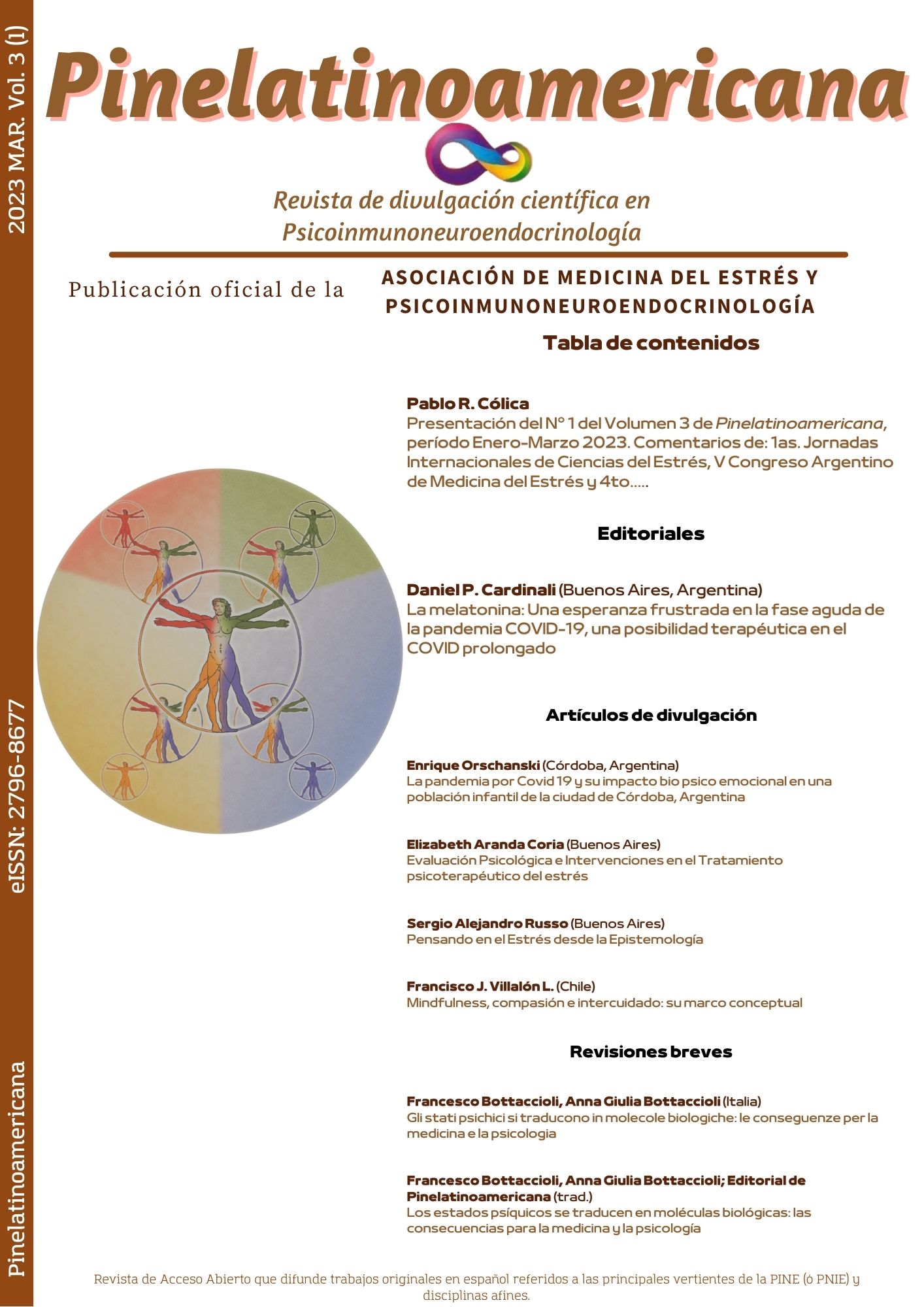Resumo
Mindfulness se espalhou nos últimos anos em diferentes campos, incluindo saúde, educação e organizações. Também em resposta à instrumentalização, a dimensão da compaixão foi explicitamente incorporada. Este aumento tem apresentado um corpo de conhecimento em desenvolvimento, incluindo sua definição, formas de medição e o efeito de programas baseados na consciência ou compaixão nos níveis corporal, psicológico, social e neurobiológico. A rica história e o crescimento científico apresentam uma diversidade de programas com diferentes focos populacionais, práticas de meditação, exercícios, ensinamentos e duração. Além disso, este progresso também permitiu a detecção de efeitos adversos, dificuldades na avaliação, juntamente com oportunidades de melhoria que permitem um maior desenvolvimento do conhecimento. O objetivo deste artigo é fornecer uma estrutura conceitual das principais descobertas da década, elementos relevantes para avaliação, disseminação e tomada de decisão, e oportunidades para construir um corpo de conhecimento e aplicação culturalmente relevante e sensível na América Latina.
Referências
Ashar, Y. K., Andrews-Hanna, J. R., Dimidjian, S., y Wager, T. D. (2016). Toward a Neuroscience of Compassion en J. D. Greene, I. Morrison, y M. E. P. Seligman (Eds.), Positive Neuroscience (pp. 125-142). Oxford University Press. https://doi.org/10.1093/acprof:oso/9780199977925.003.0009
Bishop, S. R. (2004). Mindfulness: A Proposed Operational Definition. Clinical Psychology: Science and Practice, 11(3), 230-241. https://doi.org/10.1093/clipsy/bph077
Britton, W. B., Lindahl, J. R., Cooper, D. J., Canby, N. K., y Palitsky, R. (2021). Defining and Measuring Meditation-Related Adverse Effects in Mindfulness-Based Programs. Clinical Psychological Science, 216770262199634. https://doi.org/10.1177/2167702621996340
Cebolla, A., Galiana, L., Campos, D., Oliver, A., Soler, J., Demarzo, M., Baños, R., Feliu-Soler, A., y Garcia-Campayo, J. (2017). How Does Mindfulness Work? Exploring a Theoretical Model Using Samples of Meditators and Non-meditators. Mindfulness, 9. https://doi.org/10.1007/s12671-017-0826-7
Crane, R. S., Eames, C., Kuyken, W., Hastings, R. P., Williams, J. M. G., Bartley, T., Evans, A., Silverton, S., Soulsby, J. G., y Surawy, C. (2013). Development and Validation of the Mindfulness-Based Interventions – Teaching Assessment Criteria (MBI:TAC). Assessment, 20(6), 681-688. https://doi.org/10.1177/1073191113490790
Davids, T. W. R. (1881). Buddhist suttas. Clarendon Press. https://babel.hathitrust.org/cgi/pt?id=hvd.ah6594&view=1up&seq=6
Farias, M., Brazier, D., y Lalljee, M. (2021). The Oxford Handbook of Meditation. Oxford University Press.
Ferrari, M., Hunt, C., Harrysunker, A., Abbott, M. J., Beath, A. P., y Einstein, D. A. (2019). Self-Compassion Interventions and Psychosocial Outcomes: A Meta-Analysis of RCTs. Mindfulness, 10(8), 1455-1473. https://doi.org/10.1007/s12671-019-01134-6
García Campayo, J., y Demarzo, M. (2018). ¿Qué sabemos del mindfulness? (1a ed). Editorial Kairós SA.
Gilbert, P. (2010). Compassion Focused Therapy: Distinctive Features (1a ed). Routledge.
Goldberg, S. B., Riordan, K. M., Sun, S., y Davidson, R. J. (2022). The Empirical Status of Mindfulness-Based Interventions: A Systematic Review of 44 Meta-Analyses of Randomized Controlled Trials. Perspectives on Psychological Science, 17(1), 108-130. https://doi.org/10.1177/1745691620968771
Gonzalez-Hernandez, E., Harrison, T., y Fernández-Carriba, S. (2019). A Program of Cognitively-Based Compassion Training.
Howarth, A., Smith, J. G., Perkins-Porras, L., y Ussher, M. (2019). Effects of Brief Mindfulness-Based Interventions on Health-Related Outcomes: A Systematic Review. Mindfulness, 10(10), 1957-1968. https://doi.org/10.1007/s12671-019-01163-1
Lang, P. (2022). Empatía, intuición y cognición en el proceso terapéutico de adultos mayores. Pinelatinoamericana, 2(3), 194–202. https://revistas.unc.edu.ar/index.php/pinelatam/article/view/39248
Tang, Y. Y., Hölzel, B. K., y Posner, M. I. (2015). The neuroscience of mindfulness meditation. Nature Reviews Neuroscience, 16(4), 213-225. https://doi.org/10.1038/nrn3916
Van Dam, N. T., van Vugt, M. K., Vago, D. R., Schmalzl, L., Saron, C. D., Olendzki, A., Meissner, T., Lazar, S. W., Kerr, C. E., Gorchov, J., Fox, K. C. R., Field, B. A., Britton, W. B., Brefczynski-Lewis, J. A., y Meyer, D. E. (2018). Mind the Hype: A Critical Evaluation and Prescriptive Agenda for Research on Mindfulness and Meditation. Perspectives on Psychological Science, 13(1), 36-61. https://doi.org/10.1177/1745691617709589
Van Gordon, W. y Shonin, E. (2020). Second-Generation Mindfulness-Based Interventions: Toward More Authentic Mindfulness Practice and Teaching. Mindfulness, 11(1), 1-4. https://doi.org/10.1007/s12671-019-01252-1
Villalón, F., Escaffi, M. y Correa, M. E. (In press). Validación de la escala Self Compassion Scale Short Form en profesionales y estudiantes de medicina en Chile. Revista médica de Chile.
Villalon, F., Mundt, A. y Escaffi, M. (In Press). Validación de la escala Five Facets of Mindfulness Short Form en estudiantes y profesionales de medicina en Chile. Revista médica de Chile.
Zhang, D., Lee, E. K. P., Mak, E. C. W., Ho, C. Y., y Wong, S. Y. S. (2021). Mindfulness-based interventions: An overall review. British Medical Bulletin, ldab005. https://doi.org/10.1093/bmb/ldab005
Zhang, L., Lopes, S., Lavelle, T., Jones, K. O., Chen, L., Jindal, M., Zinzow, H., y Shi, L. (2022). Economic Evaluations of Mindfulness-Based Interventions: A Systematic Review. Mindfulness, 13(10), 2359-2378. https://doi.org/10.1007/s12671-022-01960-1

Este trabalho está licenciado sob uma licença Creative Commons Attribution-NonCommercial 4.0 International License.
Copyright (c) 2023 Pinelatinoamericana

